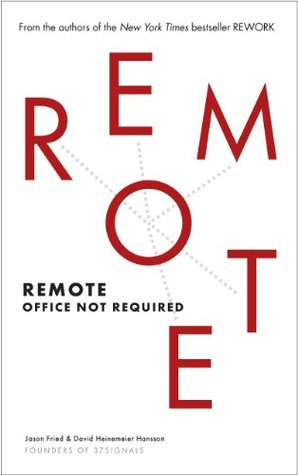More on this book
Community
Kindle Notes & Highlights
The new luxury is the luxury of freedom and time. Once you’ve had a taste of that life, no corner office or fancy chef will be able to drag you back.
It’s tempting to think that this kind of magic only happens when people can see and touch each other.
Most work is not coming up with The Next Big Thing. Rather, it’s making better the thing you already thought of six months—or six years—ago. It’s the work of work.
A stuffed backlog is a stale backlog.
Only about three times a year does the whole company get together in the Chicago office.
There’s no guarantee of productivity.
“If we’re struggling with trust issues, it means we made a poor hiring decision. If a team member isn’t producing good results or can’t manage their own schedule and workload, we aren’t going to continue to work with that person.
It’s as simple as that. We employ team members who are skilled professionals, capable of managing their own schedules and making a valuable contribution to the organization. We have no desire to be babysitters during the day.”
If you’re not trusted to work remotely, why are you trusted to do anything at all?
when we feel ourselves regularly succumbing to them—that our work is not well defined, or our tasks are menial, or the whole project we’re engaged in is fundamentally pointless.
Once a corporate behemoth has built a big fat moat around a herd of cash cows, who cares how many cow herders they have or how little they get done?
When everyone is sitting in the same office, it’s easy to fall into the habit of bothering anyone for anything at any time, with no regard for personal productivity. This is a key reason so many people get so little done in traditional office setups—too many interruptions.
No, the body language doesn’t carry over, but unless you’re firing someone or conducting a difficult review, maybe that doesn’t matter as much as you think.
It’s rarely spelled out directly, but a lot of the arguments against working remotely are based on the fear of losing control.
Because reptilian resistance is not rational but deeply emotional—even instinctual—the excuse “but I’ll lose control” is the toughest to overcome.
Much of the magic that people ascribe to sitting together in a room is really just this: being able to see and interact with the same stuff.
The point is to avoid locking up important stuff in a single person’s computer or inbox. Put all the important stuff out in the open, and no one will have to chase that wild goose to get their work done.
Yes, it can also be used to answer questions about work, but its primary function is to provide social cohesion.
At 37signals we’ve institutionalized this through a weekly discussion thread with the subject “What have you been working on?” Everyone chimes in with a few lines about what they’ve done over the past week and what’s intended for the next week. It’s not a precise, rigorous estimation process, and it doesn’t attempt to deal with coordination. It simply aims to make everyone feel like they’re in the same galley and not their own little rowboat.
One of the secret benefits of hiring remote workers is that the work itself becomes the yardstick to judge someone’s performance.
So instead of asking a remote worker “what did you do today?” you can now just say “show me what you did today.”
What exactly is wrong with meetings and managers (or M&Ms, as we call them)? Well, there’s nothing intrinsically wrong with them. What’s wrong is how often they’re applied in office situations.
When meetings are the norm, the first resort, the go to tool to discuss, debate, and solve every problem, they become overused and we grow numb to the outcome. Meetings should be like salt—sprinkled carefully to enhance a dish, not poured recklessly over every forkful.
“drop what you’re doing right now to entertain me!”
That’s the great irony of letting passionate people work from home. A manager’s natural instinct is to worry about his workers not getting enough work done, but the real threat is that too much will likely get done.
they even have an internal process for this called “Ergonomics for Professionals” to ensure employees get it right.
As it turns out, people who’ve been with a company for a long time make ideal remote workers. They already know everyone, how everything works, and what they need to do. Throwing away all that knowledge and good spirit is not only dumb, it’s expensive.
Keeping a solid team together for a long time is a key to peak performance. People grow closer and more comfortable with each other, and consequently do even better work.
Remember: sentiments are infectious, whether good or bad.
things like snippy comments or passive-aggressive responses. While this responsibility naturally falls to those in charge, it works even better if policed by everyone in the company.
There’s simply no getting around it: in hiring for remote-working positions, managers should be ruthless in filtering out poor writers.
Start by empowering everyone to make decisions on their own. If the company is full of people whom nobody trusts to make decisions without layers of managerial review, then the company is full of the wrong people.
Second, you must make sure that people have access, by default, to everything they need. Most companies start out by adopting the reverse policy: everyone is only granted access to information and applications on a need-to-know basis. That’s completely unnecessary.
Trying to conjure motivation by means of rewards or threats is terribly ineffective. In fact, it’s downright counterproductive.
Rather, the only reliable way to muster motivation is by encouraging people to work on the stuff they like and care about, with people they like and care about. There are no shortcuts.


